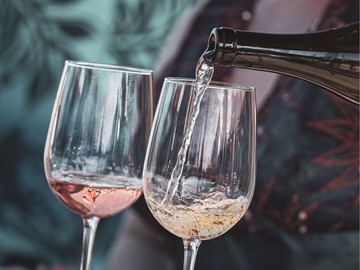Founder, Owner, Winemaker, Hose Dragger, Vine Pruner and amateur blog writer...
Winemaking Bag Of Tricks
I recently attended the annual wine industry symposium (held in January in Sacramento). Pretty much as I do every time after I attend – I swear I will never go again… Between the hassles of driving to and parking in downtown Sacramento during a convention to the barrage of emails in my inbox from every vendor that bought the mailing list of the attendees, it is enough to make you wish for a different career, something more wholesome and clean, like a garbage collector perhaps. Maybe it is just me getting old, reminiscing about days past when we did not call this an “industry”. Not that long ago, it seems, no one thought there was a need to list the ingredients on a wine label, mostly because other than grapes, barrels (yes, that is considered an ingredient, even by the IRS), and a few organic substances (acids in warm climates, sugar in cold ones, some clays and some sulfur products) – one rarely needed anything else. If you did, it meant your winery had a problem: either it grew or purchased crappy grapes or it had a crappy winemaker. Hey, don’t blame me… as George Carlin once said: “Somewhere out there is the worst doctor on the planet, and one of you may have an appointment with him tomorrow!”
Don’t get me wrong – every winemaker needs a bag of tricks, just as any chef does. It just appears that these days, winemakers are either being pushed to or just got accustomed to reach into the bag before the grapes even begin ripening on the vine. At least that is the feeling you get when you go to a winemaking convention and see booths filled with liquid oak tannins and monoterpene-releasing enzymes, gums and color enhancers.
When approached purely as a commodity, wine production needs to be standardized and predictable, no different than a box of cereal or a can of soda. It is thus understandable that large wine factories need to manipulate their wines so that they fit a specific mold or flavor profile, it is too big of a financial risk to not do so. So I ask myself why am I bothered by all of this? Who appointed me to the Wine Purity Police? Of course, I did (or was it the HOSEMASTER™ ?). After a bit of soul-searching and chats with other winemakers I realized that what really bothers me is that in our quest for knowledge and improvement we just stumble upon or invent ways to make things easier, we find shortcuts. In my book, shortcuts are fine but you have to be willing to pay the price. A good current example is an optical berry sorter developed a few years ago and now finding its way to wineries that actually have a capital budget. Grapes arriving from the vineyard are destemmed (separated from the stem of the cluster) and before they reach the crusher (or tank) they are flung in the air where an optical sensor directs blast of air to “knock off” the path any berries that are not fully colored, raisined or otherwise compromised. Great technology, and when you walk by the booth that sells this machine you will hear a sales pitch that makes so much sense you will, right away, reach into your pocket and write a check with many zeroes on it to be in line for the next available delivery date (not really). But does it really makes sense? A rough calculation shows that if you just pay the grape pickers $2.50 an hour more and train them better you will not get crappy grapes in your winery to begin with! Here is another reason it does not make sense: by having this capability in the winery, you (as a winemaker) are basically broadcasting to your grower that they can be lax in the quality of grapes he or she delivers to you (since you are going to sort them anyway, duhh). In my second harvest as a head winemaker, I got a load of grapes that was full of leaves. After five bins were dumped in the press I told everyone to stop and take a coffee break. I called the vineyard manager to come over immediately and took him to the top of the press so he can peek inside and see for himself. Calmly, I asked: “What do you think, shall I make a salad or a wine?” For the next seventeen years I barely saw a leaf in one of the grape bins.
At Longboard, you know I strive for balance. It is not just a cute PR shtick or a linguistic thread to connect surfing and winemaking (although I like the connection from a spiritual point of view) – it is something that permeates my path in life. I really do believe that while it is very important to study and master tradition and history – it is just as important to break some rules and explore innovation. I have no plans to buy Blueberry concentrate or an optical grape sorter anytime soon, but just in case I get lazy in the future, I think I will keep attending the annual convention in Sacramento, call me if you find a parking space.

Longboard
5 Fitch Street
Open 11 am to 6 pm daily